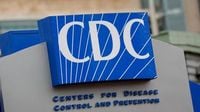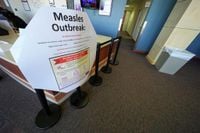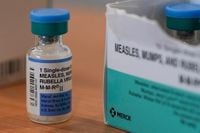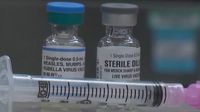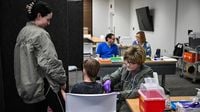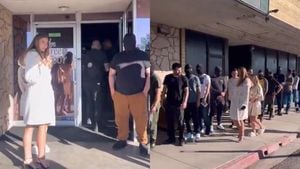A measles outbreak in Texas has intensified, with the Texas Department of State Health Services (TDSHS) reporting 378 confirmed cases across the United States as of March 2025. The outbreak, which began in late January, has primarily affected unvaccinated individuals and has raised alarms among health officials regarding vaccination rates and public health responses.
According to the TDSHS, out of the 378 cases confirmed, 327 are from Texas alone, with only two individuals fully vaccinated against the disease. The majority of those infected are either unvaccinated or have an unknown vaccination status. Tragically, the outbreak has resulted in the hospitalization of 40 individuals and the death of an unvaccinated child from a Mennonite community in West Texas, marking the first measles-related death in the United States in a decade.
The Centers for Disease Control and Prevention (CDC) emphasizes the importance of the measles, mumps, rubella (MMR) vaccine, recommending two doses: the first at ages 12 to 15 months and the second between 4 and 6 years. One dose of the vaccine is reported to be 93% effective, while two doses increase that efficacy to 97%. Health officials are urging parents to ensure their children are vaccinated, especially given the current outbreak.
In Texas, the outbreak's epicenter is Gaines County, which has reported 226 cases. Other counties, including Terry, Dawson, and Yoakum, have also seen significant numbers of cases. Lubbock County, while not at the outbreak's center, has recorded 10 cases. Katherine Wells, the public health director for Lubbock, noted that even though they are 75 miles from the epicenter, vaccinations have increased significantly in her area. "Over the last four weeks, our health department has been operating a walk-in vaccine clinic that's just for MMR, and that clinic has administered a little over 300 vaccines," she told ABC News.
In response to the outbreak, Texas has administered at least 173,362 MMR vaccine doses this year, a notable increase compared to previous years. However, the TDSHS has acknowledged that the data may not fully reflect the total number of vaccines administered, as there is no statewide requirement to report vaccine administration.
Meanwhile, New Mexico has reported 43 cases of measles, primarily in Lea County, which borders Texas. Health officials suspect a connection between the Texas and New Mexico cases, although it has not been confirmed. Between February 1 and March 24, New Mexico administered over 13,100 doses of the MMR vaccine, more than double the number administered during the same period last year. Robert Nott, communications director for the New Mexico Department of Health (NMDOH), expressed cautious optimism about the increase in vaccinations but warned, "You can see nationwide: measles is highly contagious."
Measles is notorious for its contagiousness; one infected person can spread the virus to up to nine out of ten susceptible individuals. The virus can remain airborne and viable on surfaces for up to two hours, making it a significant public health concern. Wells stated during a recent press briefing that controlling the outbreak could take up to a year. "Our number of cases are continuing to increase daily. There are also still cases that are unreported or under-reported because people aren't seeking testing," she said.
Amidst the outbreak, vaccination rates in Texas schools have come under scrutiny. Reports indicate that close to half of public school districts and private schools in Texas have kindergarten measles vaccination rates below the 95% threshold considered necessary for herd immunity. Many of the schools with low vaccination rates are public charter and private Christian institutions. The Houston Health Department recently confirmed the city's first non-adult measles case since 2018, highlighting the urgency of addressing vaccination gaps.
Dr. Peter Hotez, co-director of the Center for Vaccine Development at Texas Children’s Hospital, likened the situation to a hurricane, stating, "As long as there's warm Caribbean waters—large populations of unvaccinated kids—this epidemic is going to continue." He emphasized the need for increased vaccination efforts, especially in communities with low coverage.
In response to the outbreak, several school districts in Houston are ramping up their vaccination efforts. Houston ISD reported that approximately 94% of kindergartners and seventh graders had received the MMR vaccine in the most recent school year. The district is working with local health officials to provide additional vaccine clinics and resources to increase vaccination rates among students.
In Alief ISD, 6% of the district’s 38,610 students are not compliant with measles vaccination requirements. The district is actively reaching out to parents of students who are delinquent on their vaccinations. Fort Bend ISD reported that just 1.7% of its 79,990-student body is unvaccinated for the MMR vaccine, but the district is still taking precautions to ensure that students are properly immunized.
Despite the challenges, the response from health officials and school districts indicates a concerted effort to combat the outbreak and prevent further infections. Vaccination remains the key line of defense against measles and other communicable diseases. As health officials continue to monitor the situation, the message is clear: vaccination is vital in protecting not only individuals but also entire communities from the resurgence of preventable diseases.

